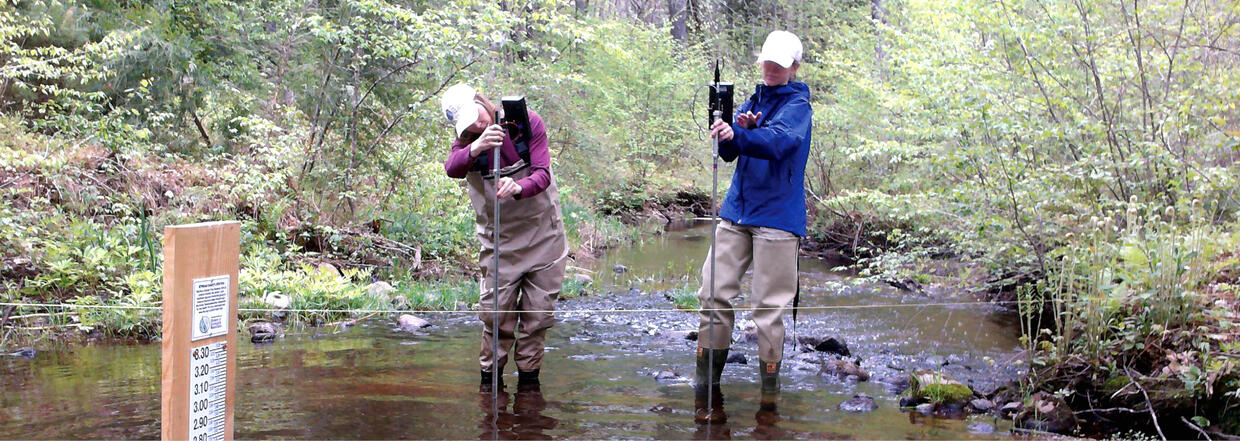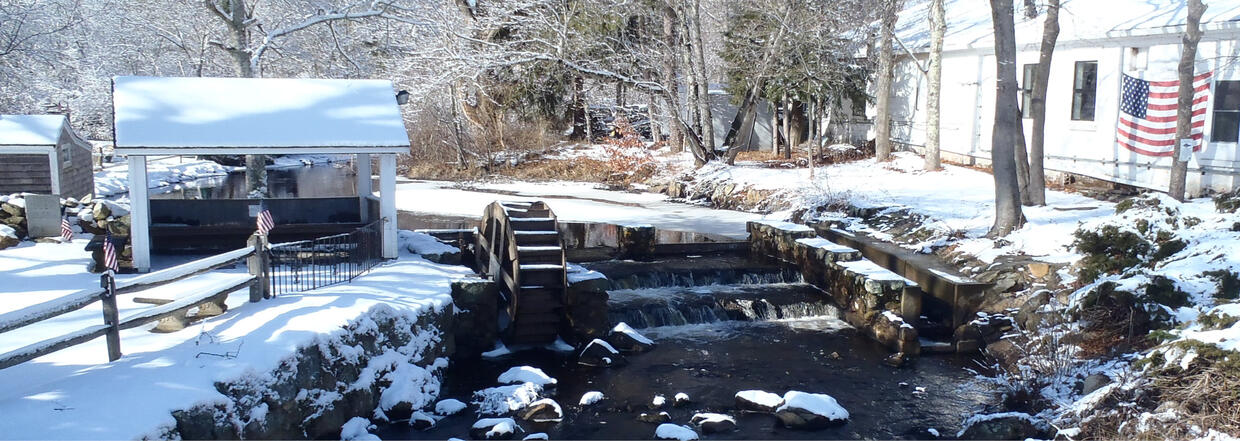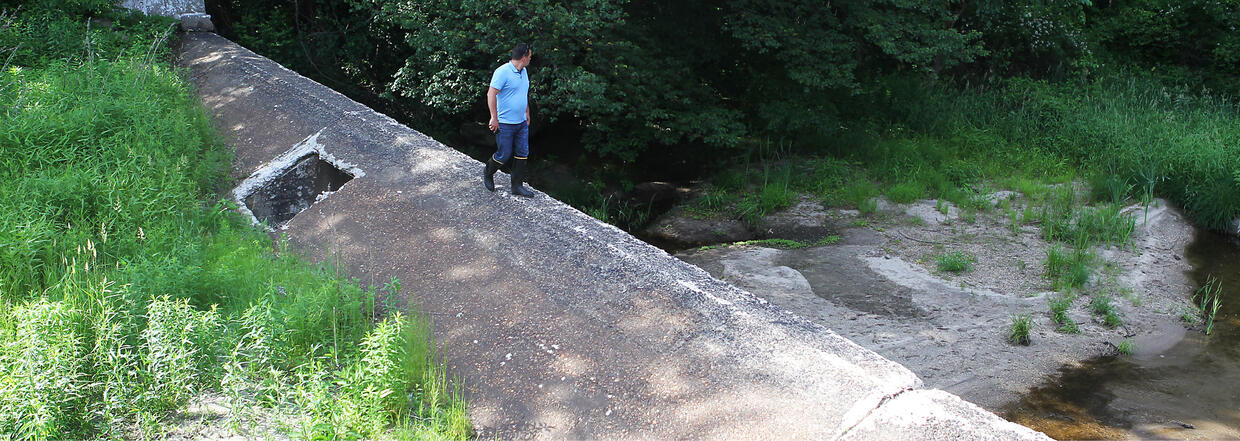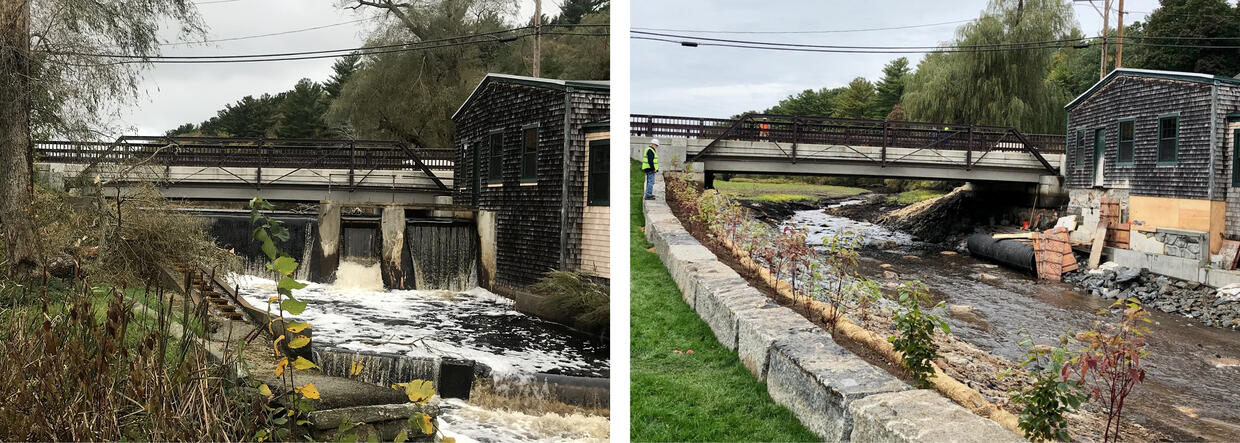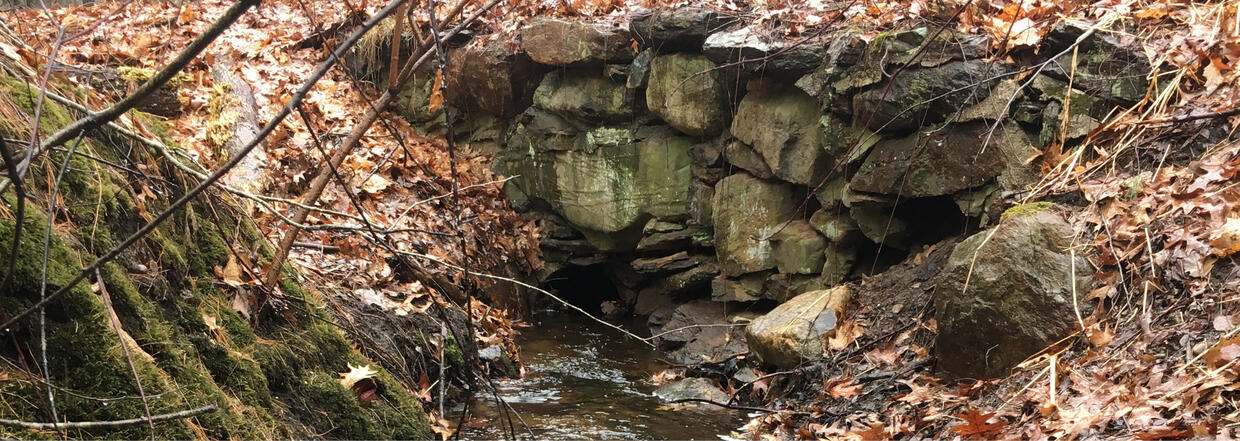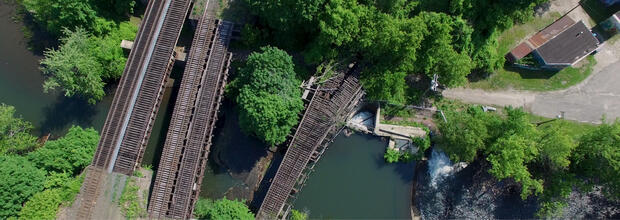DER’s 10th Anniversary: Helping Municipalities Replace Outdated and Undersized Culverts
DER estimates that more than half of Massachusetts’ 25,000 culverts and small bridges restrict streamflow, create barriers to fish, and pose a risk to the public due to their vulnerability to failure during storm events. Since its inception, DER has worked with partners across the state to determine the impacts that undersized culverts have on river ecosystems, to develop culvert replacement guidance, and to help cities and towns replace undersized and failing culverts with larger, safer structures.
Fifteen years ago, the Massachusetts Riverways Program (now part of DER) worked with the University of Massachusetts, The Nature Conservancy, and several other state agencies and NGOs to determine the extent and type of barriers that road-stream crossings create for fish and wildlife movement. In addition to developing an inventory and assessment protocol, the partners developed guidance for replacement structures to facilitate the movement of fish and wildlife, as well as the natural stream processes of moving water, sediment and wood. This guidance was released in the 1st edition of the Massachusetts Stream Crossing Handbook.
By 2014, even with new guidance and regulatory standards, most culverts weren’t being replaced to meet these stream crossing standards. DER conducted a survey of municipal road managers to identify the major barriers they face when trying to upgrade culverts. More than 100 municipalities across Massachusetts responded to the survey revealing that municipalities face challenges at all steps in the culvert replacement process.
Challenges faced by municipalities include a lack of in-house expertise with design of culverts; inability to identify which culverts are most vulnerable to washouts; difficulty with the permitting process; and lack of funds for engineering, design and construction. The survey highlighted that more coordinated efforts were needed to assist municipalities. Later that year, in response to the survey, DER launched the Stream Continuity Program with the goal of building municipal capacity to replace undersized and outdated road-stream crossings in areas of high ecological value.
Over the last five years, through the Stream Continuity Program, DER has supported municipal efforts to identify, plan and implement successful culvert replacement projects. DER has built a network of culvert replacement sites across the state to serve as case studies and provide in-depth training opportunities for road managers. These training sites create a regional network of road managers with experience implementing projects to meet the Stream Crossing Standards. To date, 3 municipalities have hosted training sites. In the upcoming year, as these towns actively pursue construction funding opportunities, DER will be gearing up to expand the training initiative to other parts of the state.
In 2017, DER launched the Culvert Replacement Municipal Assistance Grant Program to help municipalities replace culverts with better design crossings. To date DER has provided incentive funding totaling over $2.5 million to 36 municipalities. Three projects have been constructed and 12 projects are almost shovel-ready.
DER continues to develop numerous tools and trainings to address the needs of municipalities across the Commonwealth. In the upcoming years, we hope to increase technical assistance and resources to help towns replace undersized, deteriorated culverts, with larger, safer structures that are resilient to extreme storms and that provide passage for fish and wildlife.
MassDEP
Most commonly, when DER and its restoration practitioner partners think of MassDEP, the first word that comes to mind is “permits”. This is with just-cause, as all restoration projects, prior to implementation, are expected to trigger some degree of alteration to regulated natural resources and require regulatory review by MassDEP. This review of projects, impacts and alterations provides not only an added layer of protection for some of our most vulnerable natural resources, but also an opportunity to discuss best-practices and develop a shared understanding of how best to remove impairments and restore our impaired ecosystems.
In addition to enforcing laws and permitting to protect our air, land and water, MassDEP also serves to assist cities and towns with local environmental issues and works with federal, state, local and citizen partners for a cleaner environment. In this role, MassDEP often shares a non-regulatory interest in projects supported by DER, and on occasion, has opportunity to exercise its unique and often less visible role as a project partner, in advancing restoration efforts.
DER is proud to work with MassDEP as a restoration partner. DER’s Stream Continuity Program has a long history of partnering with MassDEP to establish Massachusetts’ Stream Crossing Standards and working to assist municipalities in addressing built infrastructure impacting road – stream crossings. MassDEP has been a strategic partner in the Culvert and Small Bridge Working Group. Natural Resources Damages Settlement Funding through MassDEP has funded design and engineering plans for at least three recent culvert-replacement projects.
Next, DER partners with MassDEP on projects like the Traphole Brook Dam Removal and the Elm Street Dam Removal. Just this past November, project partners celebrated the restoration of the Jones River at Elm Street in Kingston MA. This project was awarded funds via a supplemental environmental projects (SEP) in coordination with MassDEP. For the Traphole Brook Dam project, MassDEP, as a trustee of the Blackburn and Union Privileges NRD settlement, was able to provide project funding support during the design phase. As with many restoration projects, DER has many partners that help, funding is often not secured from one single source but pieced together through matching funds.
Finally, in conjunction with DER’s Streamflow Restoration Practice, MassDEP has been partnering with DER to pilot innovative water conservation campaigns to reduce summer lawn watering, described in greater detail below (learn more about that collaboration).
Healthy Lawn, Happy Summer – A Water Conservation Toolkit
DER has been working with MassDEP over the past several years to pilot water conservation strategies to reduce summer lawn watering in communities across the state. The campaigns use proven strategies to change outdoor watering behavior by providing customers targeted education and feedback to motivate changes in outdoor water use. Significant water savings have been achieved for communities implementing the campaign. On average, households that received the program used 39 gallons per day less in the summer than those that did not receive the program, with participating households using up to 128 gallons per day less in one of the pilot communities.
In October, we partnered with MassDEP to release the Healthy Lawn, Happy Summer toolkit to help water suppliers implement the campaign. The toolkit was designed with input from participating pilot towns and was developed to be user friendly and implementable by communities and water utilities with no or minimal external assistance. To learn more, please visit the project website and join us for an informational webinar on January 8, 2020 at 10am (details available on website). Technical assistance to implement a campaign may be available from MassDEP.
We hope that many communities will take advantage of this opportunity to implement this innovative and effective water conservation campaign and help their residents save water!
Improving Fish Passage and Enhancing a Local Park (Marshfield)
Design development is continuing for the proposed removal of the Veterans Memorial Park Dam in Marshfield. DER has partnered with the Town, the Marshfield Veterans’ Services, and the North & South River Watershed Association to advance a project that would enhance the aesthetic amenities of the Veterans Memorial Park and remove the dam at the head of tide. Removal of the dam will improve fish passage for river herring, American eel, and American shad that use the river and upstream habitats for spawning. The current fish ladder on the dam performs inconsistently and requires careful management during the fish run. The project will remove the dam and enhance the existing park honoring Marshfield’s veterans.
Manhan River Restoration Project Moving Towards Construction (Southampton)
Located in Southampton, the MA Office of dam Safety classifies the Lyman Pond Dam as a Significant hazard dam in Unsafe condition. The dam’s removal would eliminate the threat of failure on adjacent infrastructure. Once complete, the project will also reconnect over 27 miles of a certified Coldwater Fishery Resource and improve habitat for rare mussels and the eastern box turtle.
The project continues to advance toward construction. The Town of Southampton recently received funding to relocate the Town water main that crosses the river just upstream from the Lyman Pond Dam. DER contributed funding and technical support to the water main relocation design and permitting. Meanwhile permits are accumulating for the removal of the dam, which is privately owned. Depending on the success of partner fundraising, we are anticipating a dam removal in 2020. DER has received funding from the National Fish and Wildlife Foundation and USFWS to support this project.
Coonamessett River Restoration Project Phase II Kicks off (Falmouth)
In late October over 50 people gathered by the Coonamessett River to cut the ribbon for the new Swift’s Crossing boardwalk, unveil an interpretive sign, and break ground for the second phase of the Coonamesset River Restoration Project. This phase of work will restore an additional 30+ acres of riparian wetland corridor and 3,000 linear feet of the Coonamessett River, remove a valley-spanning earthen dike/dam, and replace an undersized culvert along John Parker Road. Phase 1 of this restoration work was completed in May 2018, and included 10 acres of riparian wetland corridor restoration, 1,700 linear feet of river restoration, and removal of the first dam from the ocean. For more information, view this video which covers the first phase of the Coonamessett Restoration Project including how the project came about and footage of the newly restored wetland areas.
Jones River Flowing Freely (Kingston)
After 300 years of being dammed, the Jones River in Kingston is now flowing freely at Elm Street. Removal of this dam began in the summer and wrapped up in October. Located at the head of tide (first dam from the ocean), removal of the dam will restore habitat and improve connectivity to over 24 miles of river habitat for target species including: alewife, blueback herring, and rainbow smelt. DER was excited to gather with partners in November to celebrate. Several partners marked the occasion by kayaking through the former dam site. Thanks to all the partners who contributed to this effort including the Jones River Watershed Association, the Town of Kingston, DMF, MassWildlife, National Marine Fisheries Service, NOAA, MassDEP and other project partners on this removal.
Expanding Capacity for Municipal Culvert Replacement (Boxford)
Since 2017, DER has been supporting the Town of Boxford’s efforts to replace an undersized culvert on a tributary to the Parker River with a structure meeting improved stream crossing and engineering design standards. The design and permitting is complete and Boxford plans to install the improved culvert by June 2020 - helped in part by grant funding from DER. This site is part of our network of training sites across the Commonwealth. When construction is underway, DER and the Town will lead a training session on construction techniques and practices for road managers leading this type of project.
Flash From the Past: Tidal Restoration - Freemans Pond Completed in 2013 (Brewster)
Completed in 2013, the Freeman’s Pond project replaced an undersized culvert that restricted flow between Paine’s Creek and Freemans Pond on the southeast side of Route 6A in Brewster. The project improved tidal flow, benefitted over 20 acres of salt marsh and associated plant communities, fish and coastal bird species. The site has an active anadromous fish run for herring and brown trout.
Images: Top Left to Right: Freeman's Pond Before, during and after culvert upgrade. Bottom Left to Right: Freeman's Pond site this year.
DER Releases Six Part Film Series
DER is excited to present this six part film series entitled River Run – A Story of Dam Removal in Massachusetts, created in partnership with the University of Massachusetts Amherst’s Science Media Collaborative. Each short video highlights the efforts of DER and partners to advance river restoration projects across the Commonwealth. These films highlight the benefits, challenges, and local perspectives of dam removal across Massachusetts. The films below follow 8 dam removal projects and capture the removal of 5 dams. Watch all the films.
Restoration Resources
Grants
Grant - MassTrails - The 2020 MassTrails Grant Round is now accepting applications. The closing date for applications is Saturday, February 1st, 2020. MassTrails provides grants to support recreational trail and shared use pathway projects across the Commonwealth. Grant amounts are dependent on the project and its needs, but generally range from $5,000 to $100,000 with grants of up to $300,000 awarded to projects demonstrating critical network connections of regional significance. To apply or for more information.
EEA's Municipal Vulnerability Preparedness (MVP) Program -The MVP Grant Program provides planning grant funds to cities and towns to complete a community-driven process to identify hazards and develop strategies to improve resilience. The MVP Planning Grants enable municipalities to work through a community-based workshop process to identify key climate-related hazards, vulnerabilities and strengths, develop adaptation actions, and prioritize next steps. For details on the application, see link. Deadline: January 15, 2020
MassTrails Grants - Communities, public agencies, and nonprofit organizations can apply for reimbursable, matching grants of $5,000-$300,000 to design, create, maintain, and support recreational trail and shared-use pathway projects in Massachusetts through the MassTrails program. See the MassTrails Grants Guide for application details and grant documents. Proposals due by February 1, 2020.
Habitat Restoration Grants - The National Oceanic and Atmospheric Administration (NOAA) Community-based Restoration Program is seeking proposals for 2020 Coastal and Marine Habitat Restoration Grants for habitat-based projects that rebuild fisheries, aid in the recovery of threatened or endangered species, improve ecosystem health, and benefit communities and the economy. Pre-proposals are due by January 8, 2020.
Environmental License Plates - The Massachusetts Environmental Trust (MET) provides funding to many river, wetland and other water resources protection and restoration projects throughout the Commonwealth. A major source of MET’s funding comes from the sale of environmental license plates. Getting an environmental plate is easy and can be done on-line, or in person at your local Registry of Motor Vehicles office.

